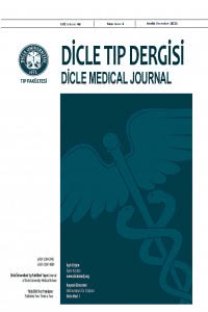Bipolar Bozukluk Manik Hecme Sırasında Düzelen Bir Kekemelik Olgusu
A Stuttering Case Getting Well During Bipolar Disorder Manic Episode
___
- Baldessarini RJ, Pérez J, Salvatore P, et all. History of bipolar manic-depressive disorder. Chapt 1. In Yildiz A, Nemeroff C, Ruiz P, editors. The bipolar book: history, neurobiology, and treatment. New York: Oxford University Press; 2015. pp 3–20.
- Sierra P, Livianos L, Rojo L. Quality of life for patients with bipolar disorder: Relationship with clinical and demographic variables. Bipolar Disord. 2005; 7: 159- 65.
- American Psychiatric Association. Diagnostic and statistical manual of mental disorders, 5th edition. Washington, DC: American Psychiatric Association; 2013.
- Yairi E, Seery CH. Stuttering: Foundations and clinical applications. Boston: Pearson, 2015.
- Guntupalli VK, Everhart DE, Kalinowski J, et all. Emotional and physiological responses of fluent listeners while watching the speech of adults who stutter. Int J Lang Comm Dis. 2007; 42: 113-29.
- Joseph AB. Transient stuttering in catatonic bipolar patients. Behav Neurolog 1991; 4: 265-9.
- Gulack BC, Puri NV, Kim WJ. Stutter exacerbated by lithium in a pediatric patient with bipolar disorder. Ann Pharmacother. 2011; 45: e57.
- Yadav DS. Risperidone induced stuttering. General Hospital Psychiatry, 2010; 32: 559-e9.
- Grover S, Verma AK, Nebhinani N. Clozapine-induced stuttering: a case report and analysis of similar case reports in the literature. General hospital psychiatry, 2012; 34: 703-e1.
- Lasić D, Žuljan Cvitanović M, Krnić S, et all. Olanzapine induced stuttering: a case report. Psychiatria Danubina, 2016; 28: 299-300.
- ISSN: 1300-2945
- Yayın Aralığı: Yılda 4 Sayı
- Başlangıç: 1963
- Yayıncı: Cahfer GÜLOĞLU
Ratlarda Siklofosfamid ile İndüklenen Hepatotoksisite Üzerine Kuersetinin Etkileri
Andiferansiye endometrial karsinomlu hastalarda sağ kalım sonuçları
İdrar Yolu Enfeksiyonu Geçiren Diyabetli Hastalarda Siprofloksasin İyi Bir Seçenek Değildir
Nevzat GOZEL, Ayse Sagmak TARTAR, Emir DONDER, Kader UĞUR, Bedrettin ORHAN, İsa Ahmet BAL, Abdullah Mubin ÖZERCAN
Which Method is More Effective in Aerochamber Training in Pediatric Age Group?
MEHMET YAŞAR ÖZKARS, Serkan KİRİK
Katarakt Cerrahisi ile Aynı Seansta Skleral Askılı Göz İçi Lens Yerleştirilmesi
Selahattin BALSAK, Zeynep GÜRSEL ÖZKURT
Bipolar Bozukluk Manik Hecme Sırasında Düzelen Bir Kekemelik Olgusu
Aerochamber Eğitiminde Hangi Yöntem Daha Etkili?
Mehmet Yaşar ÖZKARS, Serkan KIRIK
Türk kadınlarında görülen saç ve saçlı deri hastalıklarının değerlendirilmesi
Atiye OĞRUM, HAVVA YILDIZ SEÇKİN
İbrahim KAPLAN, Mazhar Müslüm TUNA, Alpaslan Kemal TUZCU, Zafer PEKKOLAY, Zeki AKKUŞ, Şadiye ALTUN TUZCU, Mehmet GÜVEN
